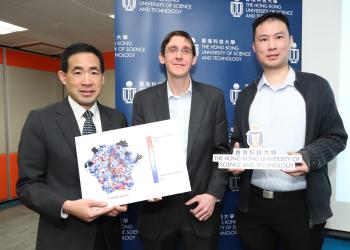News & Stories
2020

News
New Method Identifies Adaptive Mutations in Complex Evolving Populations
A research team co-led by a scientist at the Hong Kong University of Science and Technology (HKUST) has developed a method to study how HIV mutates to escape the immune system in multiple patients, which could inform HIV vaccine design.
HIV, which can lead to AIDS, evolves rapidly and attacks the body’s immune system. Genetic mutations in the virus enable it to evade immune responses mounted by T cells and antibodies, which makes it all the more difficult to design an effective solution. While there is no effective cure for the virus currently available, it can be controlled with medication.
Now, the international research team has devised a new method from conventional statistical physics to reveal patterns of selection in HIV evolution using 14 patient data sets, providing a means to efficiently distinguishing the mutations that help the virus escape the immune system from those that are only random variations.
2018

News
HKUST Researchers Discover Fitness Landscape of HIV Envelope Protein That May Help Vaccine Development
An international multi-disciplinary research team led by scientists at the Hong Kong University of Science and Technology (HKUST) has discovered for the first time a computational framework that could map out the fitness landscape of a crucial protein in the human immunodeficiency virus (HIV), potentially paving the way for rational design of a vaccine that may force the deadly virus to mutate into forms that lead to its demise.
Despite significant advances in medicine, an effective vaccine for HIV is still not available, although recent hope has emerged through the discovery of antibodies capable of neutralizing diverse HIV. The virus, however, can still evade known broadly neutralizing antibody responses via mutational pathways, which makes it all the more difficult to design an effective solution.






